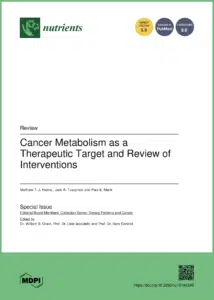Cancer Metabolism as a Therapeutic Target and Review of Interventions
Matthew T. J. Halma, Jack A. Tuszynski, Paul E. Marik

Cancer is amenable to low-cost treatments, given that it has a significant metabolic component, which can be affected through diet and lifestyle change at minimal cost. The Warburg hypothesis states that cancer cells have an altered cell metabolism towards anaerobic glycolysis. Given this metabolic reprogramming in cancer cells, it is possible to target cancers metabolically by depriving them of glucose. In addition to dietary and lifestyle modifications which work on tumors metabolically, there are a panoply of nutritional supplements and repurposed drugs associated with cancer prevention and better treatment outcomes. These interventions and their evidentiary basis are covered in the latter half of this review to guide future cancer treatment.

